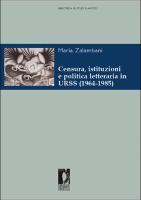Censura, istituzioni e politica letteraria in URSS (1964-1985)
| dc.contributor.author | ZALAMBANI, MARIA | |
| dc.date.accessioned | 2022-05-31T10:15:56Z | |
| dc.date.available | 2022-05-31T10:15:56Z | |
| dc.date.issued | 2009 | |
| dc.identifier | ONIX_20220531_9788864530802_169 | |
| dc.identifier | OCN: 1224379702 | |
| dc.identifier.issn | 2612-7679 | |
| dc.identifier.uri | https://library.oapen.org/handle/20.500.12657/54885 | |
| dc.language | Italian | |
| dc.relation.ispartofseries | Biblioteca di Studi Slavistici | |
| dc.subject.other | Censura | |
| dc.subject.other | Letteratura | |
| dc.subject.other | Russia | |
| dc.subject.other | Filologia slava | |
| dc.subject.other | URSS | |
| dc.title | Censura, istituzioni e politica letteraria in URSS (1964-1985) | |
| dc.type | book | |
| oapen.abstract.otherlanguage | Soviet society has always been characterised by a marked institutional censorship which, in the face of the power of the written word, has set in motion a series of highly repressive institutions. However, censorship does not necessarily exert its power through forms of coercion; there are also approaches that are implemented through a complex network of cultural institutions that can "produce" society, expunging concepts and attitudes that are a threat to the system and at the same time masterminding a series of organisms designed to forge orthodox behaviour and mindframes, to the extent that the role of the external censor often becomes almost superfluous, being replaced by the "censor of the soul". This book seeks to bring to the fore this second type of censorship, albeit without neglecting the complex repressive machinery set in motion by Soviet power. Press Review: Il Giornale, L'INTERVISTA - MARIA ZALAMBANI: «Così Breznev censurò persino Sartre» a cura di Giuseppe Ghini, 19/04/2010 | |
| oapen.identifier.doi | 10.36253/978-88-6453-080-2 | |
| oapen.relation.isPublishedBy | bf65d21a-78e5-4ba2-983a-dbfa90962870 | |
| oapen.relation.isbn | 9788864530802 | |
| oapen.relation.isbn | 9788864530758 | |
| oapen.relation.isbn | 9788892737297 | |
| oapen.series.number | 10 | |
| oapen.pages | 284 | |
| oapen.place.publication | Firenze |

